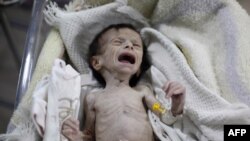ISIS may have been largely routed in Syria, but the nightmare of violence and devastation in the country continues in various enclaves, including in opposition-held eastern Ghouta, located on the outskirts of Damascus.
According to the United Nations, 400,000 people are under siege there, cut off from aid and medical help. Jan England, UN Senior Advisor for Syria told reporters that obstacles stopping the delivery of humanitarian aid and carrying out of medical evacuations are resulting in the deaths of children. “We need help from parties on the ground, by the [Syrian] Government, by all of those nations who have influence and they are not helping us as they should,” he said.
Unfortunately, the Syrian Government, with support from its ally Russia, is responsible for the siege in eastern Ghouta, and that includes stepped-up bombing attacks targeting hospitals, markets, and other civilian areas.
State Department Spokesperson Heather Nauert condemned the attacks and continuing siege:
“Deliberate tactics to starve Syrian civilians, including women and children; block humanitarian and medical aid; bomb hospitals, medical personnel, and first responders in eastern Ghouta – we consider that to be deeply to troubling. The lives of Syrian children and families are not political tools and we call on the international community to swiftly condemn those horrific acts.”
Ms. Nauert also called on Russia “to live up to its obligation to uphold the de-escalation zone in eastern Ghouta and to end all further attacks against civilians in Syria.”
“The atrocities reveal the Assad regime’s utter disregard for its own people and the extent to which it will go to retain its grip on power.”
“Acts such as these,” said Spokesperson Nauert, “clearly demonstrate the need for the international community to vigorously support the UN-led Geneva process for a political resolution to the conflict that respects the will of the Syrian people. They also emphasize the urgent need for unhindered humanitarian access and renewal of the United Nations Security Council Resolution 2165 on humanitarian access.”












